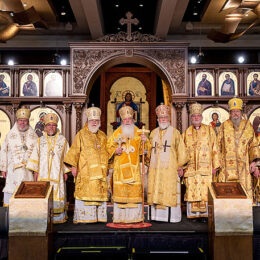Mere Christianity | C. S. Lewis
The Christian idea of marriage is based on Christ’s words that a man and wife are to be regarded as a single organism-for that is what the words ‘one flesh’ would be in modern English. And the Christians believe that when He said this He was not expressing a sentiment but stating a fact-just as one is stating a fact when one says that a lock and its key are one mechanism, or that a violin and a bow are one musical instrument. The inventor of the human machine was telling us that its two halves, the male and the female, were made to be combined together in pairs, not simply on the sexual level, but totally combined.
The monstrosity of sexual intercourse outside marriage is that those who indulge in it are trying to isolate one kind of union (the sexual) from all the other kinds of union which were intended to go along with it and make up the total union. The Christian attitude does not mean that there is anything wrong about sexual pleasure, any more than about the pleasure of eating. It means that you must not isolate that pleasure and try to get it by itself, any more than you ought to try to get the pleasures of taste without swallowing and digesting, by chewing things and spitting them out again.
As a consequence, Christianity teaches that marriage is for life. There is, of course, a difference here between different Churches: some do not admit divorce at all; some allow it reluctantly in very special cases. It is a great pity that Christians should disagree about such a question; but for, an ordinary layman the thing to notice is that the Churches all agree with one another about marriage a great deal more than any of them agrees with the outside world. I mean, they all regard divorce as something like cutting up a living body, as a kind of surgical operation. Some of them think the operation so violent that it cannot be done at all; others admit it as a desperate remedy in extreme cases. They are all agreed that it is more like having both your legs cut off than it is like dissolving a business partnership or even deserting a regiment. What they all disagree with is the modern view that it is a simple readjustment of partners, to be made whenever people feel they are no longer in love with one another, or when either of them falls in love with someone else.
Before we consider this modern view in its relation to chastity, we must not forget to consider it in relation to another virtue, namely justice. Justice, as I said before, includes the keeping of promises. Now everyone who has been married in a church has made a public, solemn promise to stick to his (or her) partner till death. The duty of keeping that promise has no special connection with sexual morality: it is in the same position as any other promise. If, as modern people are always telling us, the sexual impulse is just like all our other impulses, then it ought to be treated like all our other impulses; and as their indulgence is controlled by our promises, so should its be. If, as I think, it is not like all our other impulses, but is morbidly inflamed, then we should be specially careful not to let it lead us into dishonesty.
. . . more




